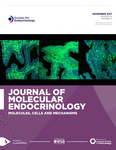Prolactin receptor in breast cancer: marker for metastatic risk
- Department of Biological Sciences, Charbonneau Cancer Institute, University of Calgary, Calgary, Alberta, Canada
- Correspondence should be addressed to C S Shemanko; Email: Shemanko{at}ucalgary.ca
Abstract
Prolactin and prolactin receptor signaling and function are complex in nature and intricate in function. Basic, pre-clinical and translational research has opened up our eyes to the understanding that prolactin and prolactin receptor signaling function differently within different cellular contexts and microenvironmental conditions. Its multiple roles in normal physiology are subverted in cancer initiation and progression, and gradually we are teasing out the intricacies of function and therapeutic value. Recently, we observed that prolactin has a role in accelerating the time to bone metastasis in breast cancer patients and identified the mechanism by which prolactin stimulated breast cancer cell-mediated lytic osteoclast formation. The possibility that the prolactin receptor is a marker for metastasis, and specifically bone metastasis, is one that may have to be put into the context of the different variants of prolactin, different prolactin receptor isoforms and intricate signaling pathways that are regulated by the microenvironment. The more complete the picture, the better one can test biomarker identity and design clinical trials to test therapeutic intervention. This review will cover the recent advances and highlight the complexity of prolactin receptor biology.
- Received 14 September 2016
- Accepted 22 September 2016
- Made available online as an Accepted Preprint 22 September 2016
- © 2016 Society for Endocrinology











